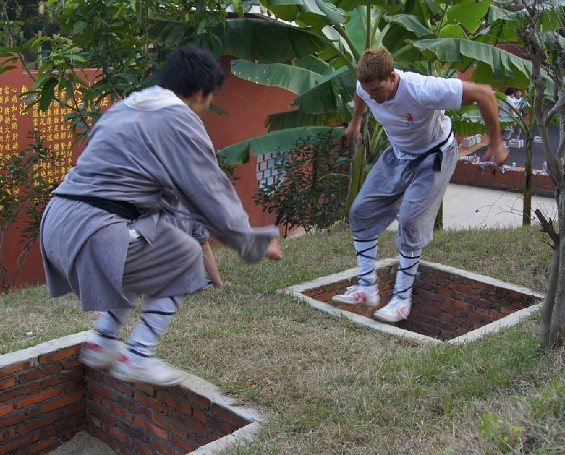- 当前位置:首页 > 传统文化 > 宋词<<关闭窗口
-
宋词
发布时间:2013-07-04 来源:中国南粤禅武文化网 [浏览次数:674 ]

苏轼像 A portrait of Su Shi
辛弃疾像 A portrait of Xin Qiji
李清照像A portrait of Li Qingzhao词,是古典诗歌的一种。词的名称很多,因为它可以配乐歌唱,所以也叫曲子词;因为它的句子长短不齐,也被称为长短句。词有很多种调名,叫作词牌,如西江月、满江红、如梦令等。
词作为一种新体诗歌,宋代时发展到了鼎盛时期。“宋词”与“唐诗”一样,在中国文学史上占有相当重要的地位。
宋词在发展过程中,产生了苏轼、李清照、辛弃疾、陆游等众多杰出的词人。
苏轼的词具有热情豪放,清新流畅的特点。他的词作内容十分广泛,有的抒发了报国的壮志;有的描写了农村的景象;有的写出了离愁别恨……他的创作,为宋词开辟了新天地。
李清照是宋代杰出的女词人。她的词作清新精巧,满怀真情,有的表达了她对爱情的理解和追求;有的描写了春花秋月的变化对人的影响;有的表现了国破家亡带来的人生苦难……像“知否,知否?应是绿肥红瘦”、“此情无计可消除,才下眉头,却上心头”等优美动人的词句,表现了李清照出众的才华。
辛弃疾是宋代词人中词作最多的作家。他的词大都洋溢?豪迈的英雄气概,如“醉里挑灯看剑,梦回吹角连营”、“青山遮不住,毕竟东流去”等千古流传的词句,不仅描写了豪壮的军旅生活,也抒发了他坚持抗金的决心和激昂的爱国之情。辛弃疾的词大大地拓展了宋词的思想内容和艺术风格。
直到今天,宋词仍然受到人民大众的喜爱,《宋词三百首》是许多家庭必备的读物,很多有名的词作还被重新谱曲,广为传唱。
附:水调歌头·苏轼
明月几时有?把酒问青天。不知天上宫阙,今夕是何年。我欲乘风归去,又恐琼楼玉宇,高处不胜寒。起舞弄清影,何似在人间!
转朱阁,低绮户,照无眠。不应有恨,何事长向别时圆?人有悲欢离合,月有阴晴圆缺,此事古难全。但愿人长久,千里共婵娟。
Ci is one of the forms of ancient poetry and can be sung to music, so it's also known as musical ci poetry. As the length of the lines in a ci poem can differ, it is also called "long and short-line verses". There are various tunes used for ci poems, so they can be sung in different ways.
Ci poetry reached its zenith during the Song Dynasty (960-1279 AD). Like Tang poetry, the Song ci poetry holds a very important position in the history of Chinese literature.
In the course of its development, many outstanding ci composers, such as Su Shi, Li Qingzhao, Xin Qiji and Lu You have appeared.
Su Shi's ci poems are unrestrained, refreshing and smooth. The contents of his ci poems are rich in subject matter, some expressing his patriotism, some describing country scenes, some depicting grievance when loved ones had to part.... His works blazed a new trail for the evolvement of ci poetry.
Li Qingzhao was an outstanding ci poetess. Her works are exquisite, refined and full of true feelings. She expressed her understanding and pursuit of true love, described the impact of the changing seasons on human feelings, and reflected the misery of people suffering from the fall of their country and the disasters that befell families. Many of her verses such as "Can't you see? / Can't you see? / The green leaves are fresh but the red flowers are fading!", "This feeling is unable to be removed. / It was shown on my knitted eyebrows a moment ago but has now come to pain my heart?b show her poetic gifts.
Xin Qiji was the most prolific among the ci poets of the Song Dynasty. His works are filled with heroism. His lines such as "Half drunk I lit the lamp to look at my sword / After dreams of the bugles in our army camps? , "Green mountains are no bar / To the river flowing on to the sea" have been circulating generation after generation. They not only reflected army life in camps but also indicated his determination to resist the Jin troops and his deep love for his own country. Xin's ci poems greatly broadened the themes and enriched the artistic style of the Song ci poetry.
It remains popular even today. The book Three Hundred Song Ci Poems sells well, and a number of renowned ci poems have been set to new tunes for singing. Here we cite Su Shi's Prelude to Water Melody (Shui Diao Ge Tou) as an example for your appreciation.
To the Tune of Prelude to Water Melody (Shui Diao Ge Tou)
Su Shi
On the Mid-Autumn Festival of the year Bingchen I drank
happily till dawn and wrote this in my cups while thinking of Ziyou.
Bright moon, when was your birth?
Wine cup in hand, I ask the deep blue sky;
Not knowing what year it is tonight
In those celestial palaces on high.
I long to fly back on the wind,
Yet dread those crystal towers, those courts of jade,
Freezing to death among those icy heights!
Instead I rise to dance with my pale shadow;
Better off, after all, in the world of men.
Rounding the red pavilion,
Stooping to look through gauze windows,
She shines on the sleepless.
The moon should know no sadness;
Why, then, is she always full when dear ones are parted?
For men, the grief of parting, joy of reunion,
Just as the moon wanes and waxes, is bright or dim;
Always some flaw ?and so it has been since of old.
My one wish for you, then, is long life
And a share in this loveliness far, far away!
【来源:中国华文教育网】
- 热门文章
-
- [2018.07.03]香港禅武堂拜访禅武国际联盟主席王德庆老师
- [2018.01.06]禅武国际联盟培养洋弟子促进中外人文交流
- [2014.03.22]禅武中心五周年邀请以及2014年办班计划
- [2023.11.28]匈牙利禅武国际联盟成功举办20周年庆典活动
- [2015.04.11]香港惠州新动力启动与禅武中心共建禅武夏(冬)令营五周年规划















